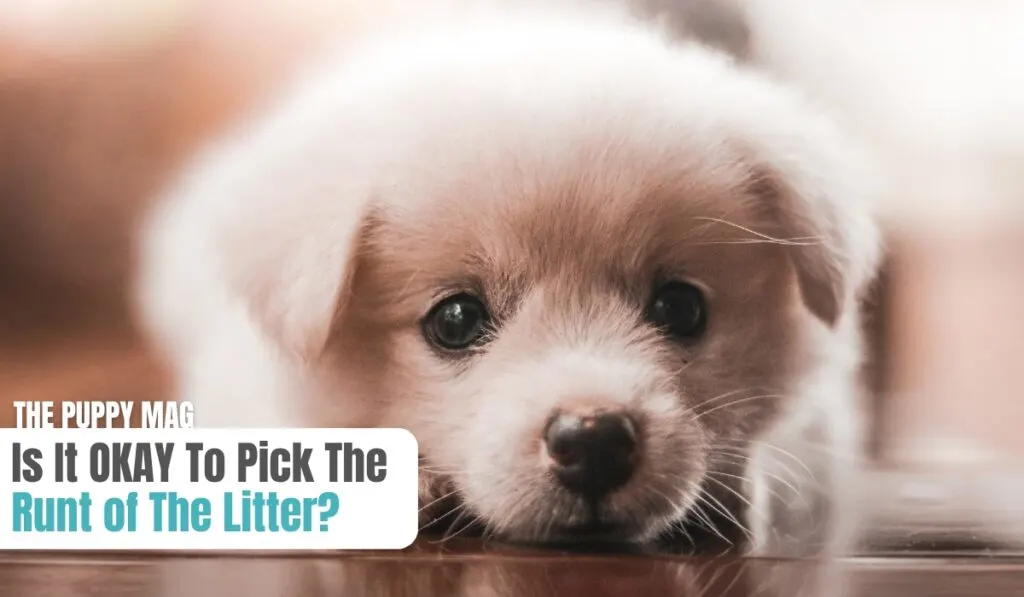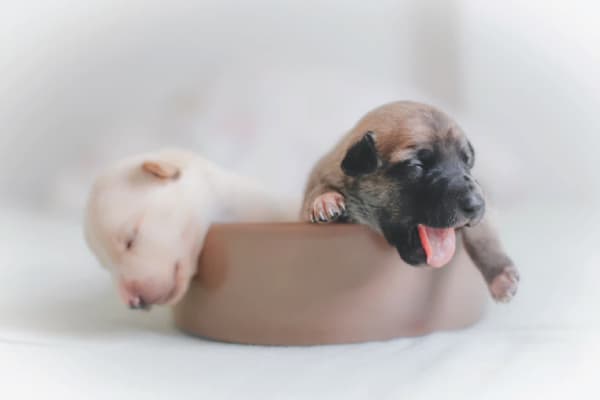When looking at a litter of puppies, you may notice one that is particularly smaller than the rest. This puppy is known as the runt of the litter. They are typically much smaller and weaker than their siblings.
Many people ask if it’s okay to pick the runt of the litter. So we’ve created this complete runt of the litter guide for you to know everything you need before making an important decision.
Let’s get into it!

What Is The Runt of The Litter?
Let’s clear this up first. Since this article is entirely about “runts” let’s make sure we both understand exactly what the “runt of the litter” really means.
Many people think of the runt as the cute one that’s just smaller than the rest.
By definition, a runt puppy will be one (or more) of the litter whose weight is abnormally low, below the healthy level for that specific breed. This is what’s considered the runt of the litter.
➡️ There can be many health issues that develop if the newborn puppy’s weight isn’t correct. That’s why it’s best to be well informed if you intend on picking the runt of the litter.
Why Are There Runts In a Litter?
It’s also good to understand how this actually happens.
➡️ Simply put, the main reason there are runts is due to poor implantation sites in the uterus, bad health of the parents, and/or congenital defects.
Two common myths:
- False. A common myth about litter runts is that they were conceived at a later stage than the rest of their litter friends, which means they would be born prematurely.
- False. An even more commonly heard myth is that runts develop in the middle of the uterus and are further away from their mother’s bloodline, leaving them undernourished. Puppies inside the womb are constantly moving around and ultimately share an even amount of nourishment. (According to Dr. Kustritz Assistant Dean of Education, Department of Veterinary Clinical Sciences)
Reasons why we have runts of the litter:
- Dr. Kustritz in her book The Dog Breeder’s Guide to Successful Breeding and Health Management, Explains that the main reason is due to poor implantation sites in the uterus.
- Any of the parents who are not in optimum health have a greater chance of producing an overall weaker litter (which will nearly always result in a runt). This can also happen if the bitch is a little too young or has prior health issues.
- Congenital defects could impair their growth in the womb. When the puppy is born, sometimes it can be visibly seen or in some cases, it will go undiscovered.
What Happens To Runts Of The Litter After They’re Born?
Any runt of the litter will have the odds stacked against them and oftentimes will need the help of the breeder to survive.
All newborn puppies completely rely on their mothers to survive for at least the first three weeks.
Depending on how many are in the litter, it can be quite challenging to receive an equal amount of attention from their mother.
This is particularly true at feeding time. When all the puppies are scrambling to get their much-needed nutrition, the runt of the litter is small and weak, meaning they’re likely to get pushed off by another puppy.
In times like this, it’s essential the breeder is there to step in and help the runt. It’s a good idea for the runt to be feeding close to the mother’s tail, as this is where her milk is the richest.
Without the much-needed support of the breeder, it’s likely the mother will pretty much give up on the runt, especially when the litter is big.
Runt Of The Litter Health Problems

The runt of the litter is, of course, more susceptible to health problems than their siblings.
This doesn’t mean to say they can’t go on to live long healthy lives, and if they are cared for correctly, they can live just as good a life as any other dog.
- When the runt is trying to survive amongst the litter, it’s so important that they receive their mother’s milk. Their mother’s milk contains very important antibodies that are designed to protect the puppies until their immune system develops, and they receive their first vaccinations.
If the runt of the litter misses out on this very important stage, their bodies will continue to weaken and they will be very susceptible to infections and other illnesses that could easily kill them.
After the runt is born, the first challenge they will face is dehydration and hypothermia. Both of these things could kill the runt easily, so it’s critical the runt receives their mother’s milk (for hydration) and that they are kept warm.
Is It Bad or Good To Pick The Runt Of The Litter?
Now we’re on to the most important question, is it ok to pick the runt of the litter? we’ll discuss all the important bits and give you our overall advice.
Firstly, when visiting the breeder to view the puppies, watch how the runt interacts with the mother and siblings. Right away, you’ll understand how much of a “runt” the runt really is! (excuse the tongue twister!)
The better the interactions are amongst the mother and siblings, signifies that this runt hasn’t been rejected too much and will indicate they have had some level of support. A great sign to look for.
Converse with the breeder and ask if the runt has had check-ups from a veterinarian (if they haven’t, they should) Don’t decide before the breeder gets the runt checked.
This will be a big factor in your overall decision, sometimes runts will develop health issues that unfortunately cannot be helped. This is a sad reality, but one that happens quite frequently.
Hopefully, you’re dealing with a responsible, caring breeder and they will explain the type of care they have given to the runt after it was born.
As long as the breeder gave adequate care for the runt, and runt has passed necessary health checks, the runt is just as good as the other pups.
If your breeder is experienced, they will know that the runt, is worth just as much as any of the other puppies. Don’t look for a bargain, focus on the health of the runt.
So to answer the question, YES it is ok to pick the runt of the litter providing they have passed necessary health check-ups and the breeder has given the necessary care for them after they were born.
Any runt can live just as well as any other puppy, providing they are looked after sufficiently.
How To Care For The Runt Of The Litter
If you do decide to pick the runt, it’s a good idea you know how to properly care for them.
You’ll need to give extra time and attention to a runt due to the challenges they face from being small and weak. Infection can happen, hypothermia, dehydration, or other issues. Here are a few tips to get you on the right path.
1) Keep them on their mother’s milk
If you want the runt of the litter, it’s a good idea to keep them with the breeder for as long as possible ensuring the breeder is giving the runt priority every feeding time.
Nothing beats the mother’s milk and it contains many essential antibodies to prevent infections and disease. Avoid taking the runt home until they are completely weaned off the mother’s milk.
Important: Human milk or cow milk is not rich enough for puppies. Do not use this, only use special puppy formulas recommended from your vet.
2) Keep them hydrated and warm
When you take them home, its vital you keep them hydrated through bottle-feeding special puppy formulas that you can get from your local veterinarian. Some are even specially designed for runts. This will provide hydration and food.
You must also keep them warm as they won’t be able to support themselves, at least in the beginning. Create a small cozy area with soft blankets and preferably an electric puppy heating pad underneath to supply constant warmth.
3) Regular check-ups with your vet
The best way to provide support is by having regular check-ups with your vet. Yes, it’s not cheap, but this is what’s necessary to ensure the health of your runt puppy.
Checks and tests will be the only way to know the real internal health of the runt, and you may find out that vaccinations will have to start earlier.
Do Runt Puppies Grow To Be Normal Size?
Although runts of the litter start off smaller than the rest, this doesn’t necessarily mean they stay small.
If the runt puppy has no underlying health issues then it’s more than likely they will grow to be the normal breed size once they start eating solid puppy food. This is, of course, providing they don’t develop any health issues along the way.
It’s all too common, we see people choose the runt of the litter with the hope that they do actually stay small! This certainly can’t be counted on.
If you want a small dog, choose a small breed!
How Much Smaller Is The Runt of The Litter?
So how much smaller should you expect a runt to be?
Ultimately, this will change significantly depending on the breed you have. Runt German shepherds are completely different from runt Chihuahuas
By definition, a runt is any puppy that’s under the average (or below the healthy level) of that breed. Many runts are between 5%-20% smaller than the breed average
If a runt’s size (weight) falls below more than 25% of where it should be (for the breed) then the chances of dying increase a lot.
Are Runt Puppies Unhealthy?

It’s simply not true that runt puppies are always unhealthy. The truth is that some runt puppies are unhealthy, and others have fairly good health.
Their health usually comes down to how quickly they received the appropriate care after being born.
Yes, it’s true that many runts are unhealthy, and if they don’t receive the vital support they need when they born, or have been rejected too much by the mother, they’ll likely be too unhealthy to survive.
However, If the runt puppy is properly cared for after being born by the breeder, it’s perfectly normal for the runt to be healthy and go on to live a healthy life.
Important Note: Runts are always underweight, and if their weight falls below 25% of what it should be for their age and breed. It significantly increases the chances of dying. That’s why it’s so crucial to have them properly examined at the vets and ensure they have maximum nourishment.
Is The Runt Of The Litter Harder To Train?
The biggest thing you need to worry about with runts, is their health, try your best not to worry about their trainability in the future. Let me explain why.
As long as your runt is “healthy” and making good progress in terms of weight, size, and general well-being, this will not affect their ability to be trained.
The truth is, a lot of patience, dedication, and consistency is required to train any puppy, runt or not.
As long as you have this, your runt will learn just like any other puppy.
One thing to remember is the breed you are buying. THIS is what will make the biggest difference. Some breeds are easy to train, some are hard, some are smart and others are not.
Hopefully, this answers any worries you had about training!
Do Runts Of The Litter Live Longer?
It’s always nice when the underdog wins… Do runts, who are supposedly the weakest and unhealthiest, go on to live longer than normal dogs?
Well, in all honesty, not really.
Once the runt of the litter gets past the critical stages, they typically make a full recovery and live a normal healthy life just like any other dog.
As of now, there’s no scientific research to back up the theory or belief that runts of the litter go on to live longer. Sure they can live a long, full healthy life, but longer than normal? It can’t be confirmed.
By the time that particular dog got to that age anyway, it would be very hard to put the long life down to being the runt, perhaps 15 years ago!
What typically determines life expectancy is their breed, health issues (recent), their diet, exercise, and general well-being.
Are Runts Of The Litter Cheaper?
If you’re choosing the runt of the litter, you should expect to pay the same price as any of the other puppies. A cheaper price should set off alarm bells.
This is important, and you should do your checks on the breeder you’re using.
Firstly, the runt should definitely not cost MORE than the other puppies, this is rarely ever the case but some breeders (if they aren’t legitimate) will think of an excuse to charge you more.
One common excuse would be that they’ve had to pay more vet bills for the runt. This isn’t a reason to charge you more. Health check-ups are factored into the pricing of the other puppies, and it should remain the same for the runt.
In the case that the breeder is charging less for the runt, it could mean two things.
1) The breeder genuinely thinks the runt is not worth as much
(unlikely if they’re a good breeder)
2) The breeder knows something you don’t
(cause for concern)
In some cases, the breeder may genuinely think the runt isn’t as valuable, however, if you’re with a reputable breeder who’s been doing it for a while, they will know that runts are just as valuable.
UNLESS they know something you don’t. This is where you need to be very careful. If the breeder insists that the runt is cheaper. You need to confirm the health of the runt, the breeder may be trying to get rid of the runt for a lower price if they know it’s not in full health.
You only need to do one thing when buying a runt. Have them checked by a veterinarian FIRST. This way, you won’t make any mistakes.
Are Runts Of The Litter More Aggressive?
When the runt of the litter is still with their mother and siblings, they will need to develop some level of bravery and “fight” in them to survive, there is the chance that they bring this with them into adulthood.
This isn’t always the case, though. Most times, the breeder will step in and pretty much support the runt to make sure they survive. Ultimately this will take away their need to “fight” for survival. So this isn’t always going to happen.
On top of that, most runts who are healthy enough to make it to adulthood, turn into normal dogs pretty quickly. They do not tend to be more aggressive than other puppies.
Aggressiveness can potentially come from their parents if they were aggressive, but this isn’t anything to do with being the runt. Aggressiveness can also come from how they have been raised by their humans. But yet again, this has nothing to do with them being the runt.
So to answer the question, no, runts are not likely to be more aggressive than the other puppies in the litter.
Does Every Litter Have a Runt?
The simple answer is No. Most litters will not have a runt. Compared to how many normal litters there are, having a litter with a runt could be considered rare.
Summary
Hopefully, now you know the answer to your original question “Is it ok to pick the runt of the litter?”
Yes, it is perfectly ok to pick the runt of the litter, providing they are healthy and receive the necessary care after they were born.
Always ensure they have passed health check-ups with a veterinarian before deciding.
Helpful Resources:
https://vetmed.umn.edu/bio/college-of-veterinary-medicine/margaret-root
https://en.wikipedia.org/wiki/Runt
https://www.ncbi.nlm.nih.gov/pubmed/28762769
